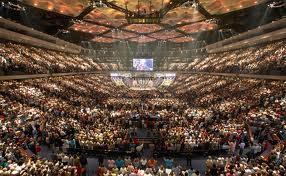Heaven and Eternity
People often ask the question, "What will heaven be like." Although the Bible discusses heaven, it is not possible to understand the full nature of heaven from a human perspective. Since heaven is where God lives, it must contain more physical and temporal dimensions than those found in this physical universe that God created. We cannot imagine, nor can we experience in our current bodies, what these extra dimensions might be like. Even so, we are given enough information in the Bible to understand many of the things that will be different in heaven compared to our lives today.
There is always hope, and the hope is in God. If you have
put your faith in Christ, then you have the ultimate hope of heaven. One day,
you will be with the Lord. And that should put everything in perspective. Our
culture is very interested in life after death, but the New Testament is much
more interested in what I've called the life after life after death — in the
ultimate resurrection into the new heavens and the new Earth.
Jesus'
resurrection marks the beginning of a restoration that he will complete upon
his return. Part of this will be the resurrection of all the dead, who will
"awake," be embodied and participate in the renewal. John
Polkinghorne, a physicist and a priest, has put it this way: "God will
download our software onto his hardware until the time he gives us new hardware
to run the software again for ourselves." That gets to two things nicely:
that the period after death is a period when we are in God's presence but not
active in our own bodies, and also that the more important transformation will
be when we are again embodied and administering Christ's kingdom. Many
evangelicals understand this future life to be divided into two distinct
periods: first, the Millennial Reign of Christ (the one thousand years) on this
earth, referred to in Revelation 20:1-10; secondly, the New Heavens and The New
Earth, referred to in Revelation 21 and 22. This millennialism (or chiliasm) is
a revival of a strong tradition in the Early Church that was dismissed by
Augustine of Hippo and the Roman Catholic Church after him.
Not only will the believers spend eternity with God, they will also spend it with each other. John's vision recorded in Revelation describes a New Jerusalem which comes from Heaven to the New Earth, which is a seen to be a symbolic reference to the people of God living in community with one another. 'Heaven' will be the place where life will be lived to the full, in the way that the designer planned, each believer 'loving the Lord their God with all their heart and with all their soul and with all their mind' and 'loving their neighbour as themselves' (adapted from Matthew 22:37-38, the Great Commandment) —a place of great joy, without the negative aspects of current earthly life.
Heaven is the opportunity to develop and fulfill dreams
bigger than anything on this earth. If we did not accomplish something on
earth, it still can be accomplished later.
This is important to realize, because there are those who
have very difficult lives. There are those whose lives were cut short. I can't
think of anything more sad than when a child dies or when a young man or woman
leaves us in what we perceive to be before their time.
But God promises to compensate. God promises to make it up
to them. Death for the Christian is not the end of life, but it is the
continuation of it in another place.
We will be better off eternally because we suffered
temporarily. I think of the here and now, but God thinks of the by-and-by. I
think of the temporal, but God thinks of the eternal. I think about what makes
me happy, but God thinks about what will make me holy. He looks at the big
picture.
First things first:
First things first:
Heaven is a place of “no mores.” There will be no more tears, no more pain, and no more sorrow (Revelation 21:4). There will be no more separation, because death will be conquered (Revelation 20:6). The best thing about heaven is the presence of our Lord and Savior (1 John 3:2).
We will be face to face with the Lamb of God who loved us and
sacrificed Himself so that we can enjoy His presence in heaven for
eternity.
The apostle John was privileged to see and report on the heavenly city (Revelation 21:10-27). John witnessed that heaven (the new earth) possesses the “glory of God” (Revelation 21:11),
the very presence of God. Because heaven has no night and the Lord
Himself is the light, the sun and moon are no longer needed (Revelation 22:5).
So in this plan and purpose of God's, there may be things I
have gone through that make no sense to me now. But when I get to heaven, I
will realize that I was a better person for them. I will see that I was made
more into the image of Jesus Christ as a result of them. I will discover that
new ministry opportunities opened up that I would not have had otherwise
because of these things.
Throughout
life, there are things we do not understand. As we mature, we begin to
understand. Likewise, we do not understand why the righteous must suffer. But
someday, in heaven, we will understand.
I think the best explanation of eternity is given by Pastor
Greg Laurie. Here is what he says:
Gone So Soon.
"We are here for only a moment, visitors and strangers
in the land as our ancestors were before us. Our days on earth are like a
passing shadow, gone so soon without a trace."
— 1 Chronicles 29:15
We make so much of this life, but it comes and goes rather
quickly. The Bible tells us, "We are here for only a moment, visitors and
strangers in the land as our ancestors were before us. Our days on earth are
like a passing shadow, gone so soon without a trace" (1 Chronicles 29:15).
We think far too much of this life and far too little about eternity.
In his book, We Shall See God, Randy Alcorn writes,
"Eternal life means enjoying forever the finest moments on Earth the way
they were intended. Since in Heaven we will finally experience life at its
best, it would be more accurate to call our present existence the beforelife
rather than to call what follows the afterlife."
It is like the previews that are shown at the beginning of a
movie. I have often found the previews are better than the actual movies they
are promoting. Of course, you don't go to a movie to watch the previews. You go
to a movie to watch the film itself.
In many ways, life on earth is like the previews that come
and go rather quickly, while the movie is like eternity. That is the main
event.
God has other times and places where our dreams and our
hopes can be realized. We see things in a certain way here on earth. But that
can change overnight. That can change in a nanosecond when we enter into
eternity.
As Dinesh D'Souza said, "Heaven is the venue of cosmic
justice. This is where the faithful servants of the Lord who came in last
receive their due prize and reward."
Surely it is not wrong for us to think and talk about
Heaven. I like to find out all I can about it. I expect to live there through
all eternity. If I were going to dwell in any place in this country, if I were
going to make it my home, I would inquire about its climate, about the
neighbors I would have — about everything, in fact, that I could learn
concerning it. If soon you were going to emigrate, that is the way you would
feel. Well, we are all going to emigrate in a very little while. We are going
to spend eternity in another world. … Is it not natural that we should look and
listen and try to find out who is already there and what is the route to take?
– D.L. Moody
For the Gospel,
Blessings,
Raj Kosaraju




Comments
Post a Comment